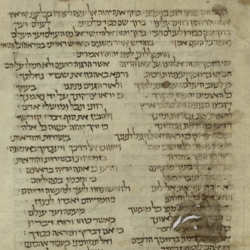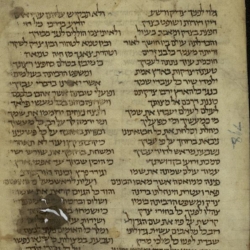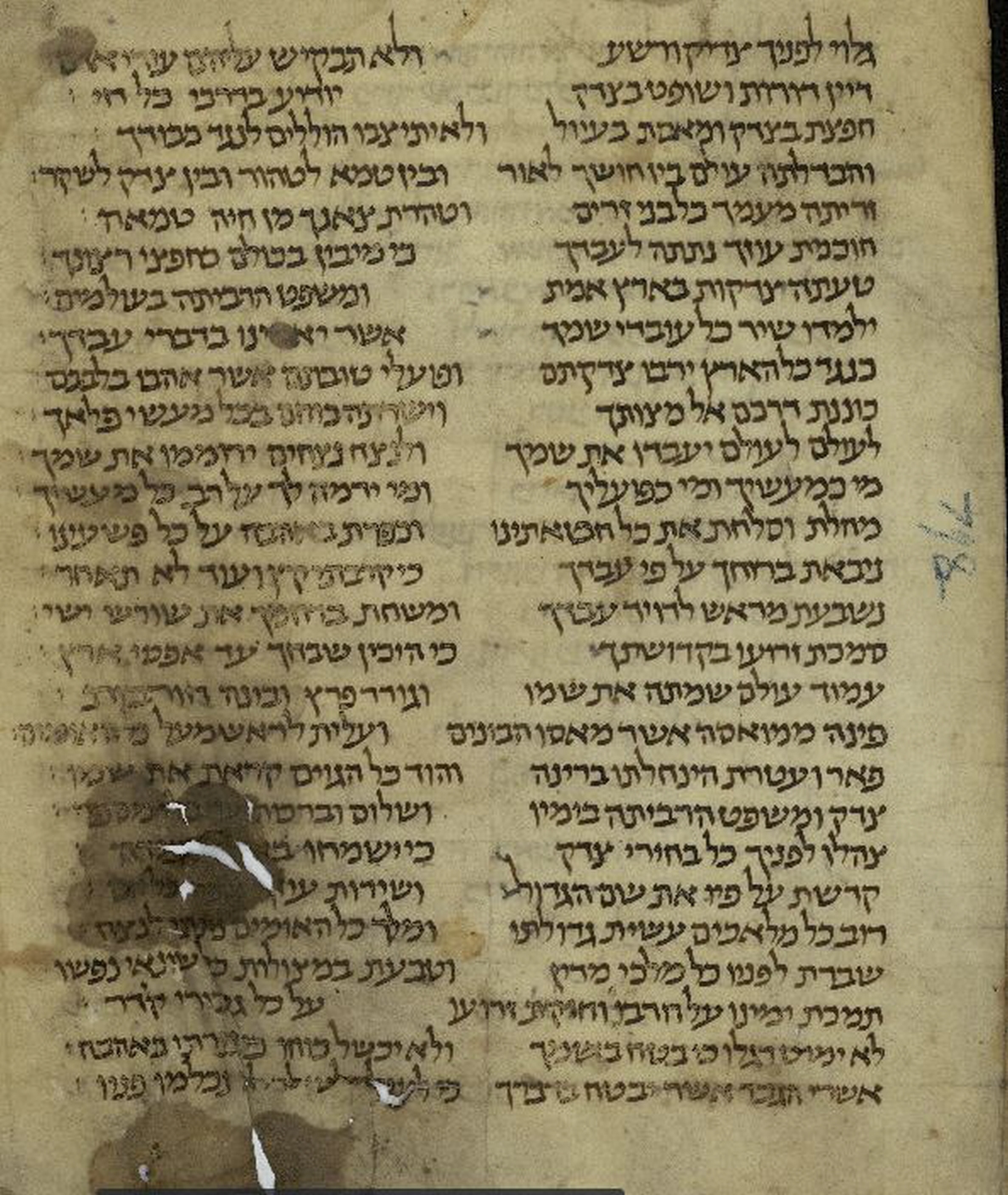Note: “The CAUSE” is used to translate the Divine Name YHVH, based on the philosophical idea of God as the Prime Mover and on the interpretation of the Name as a causative form of the copula – “causes to be.” This translation also uses the plural pronouns They/Their/Them to refer to God as a pluralis majestatis, and to avoid the implications of God being assigned a gender. (Find Ibn Ezra’s commentary on Genesis 1:1 for a discussion of the pluralis majestatis when referring to God.) All divine referents (pronouns, epithets, names) are rendered in unicase.
| Source (Hebrew) | Translation (English) |
|---|---|
|
[…][1] On the basis of the following three psalms found in MS RNL Antonin 798, the introductory verse very likely specified this psalm in the context of the first day of the month or Rosh Ḥodesh Iyyar upon which David experienced a vision. –Aharon Varady
|
[…]
|
|
[א…][2] The alphabetic acrostic would likely have begun here.
|
[…]
|
|
[ב…]
|
[…]
|
|
גָּל֣וּי לְ֭פָנֶֽיךָ צַדִּ֣יק וְרָשָׁ֑ע
וְלֹ֤א תְּבַקֵּ֣שׁ עֲלֵיהֶ֖ם עֵידֵ֣י אָדָֽם׃ |
Revealed before You is good and evil,
and You do not request any human witness for them. |
|
דַּיָּ֣ן דּ֭וֹרוֹת וְשׁוֹפֵ֣ט בְּצֶ֑דֶק
י֝וֹדִ֗יעַ בְּדַרְכֵ֥י כׇּל־חַֽי׃ |
Judge of generations and Magistrate in right,
knowing in the ways of all life. |
|
חָפַ֣צְתָּ בְּ֭צֶֽדֶק וּמָאַ֣סְתָּ בְּעָ֑וֶל[3] בעיול כתיב
וְלֹ֤א יִתְיַצְּב֥וּ ה֝וֹלְלִ֗ים לְנֶ֣גֶד כְּבוֹדֶֽךָ׃ |
You desire right and reject injustice,
and braggarts will not withstand Your glory. |
|
וְהִבְדַּ֗לְתָּה עוֹלָם֮ בֵּין־חֹ֪שֶׁךְ ל֫א֥וֹר
וּבֵ֣ין טָ֭מֵא לְטָה֑וֹר וּבֵ֥ין צֶ֝֗דֶק לְשָֽׁקֶר׃ |
And You separated eternity between dark and light,
and between impure and pure, and between right and falsehood. |
|
זָרִ֣יתָה מֵ֭עַמְּךָ כׇּל־בְּנֵ֣י זָרִ֑ים
וְטִהַ֥רְתָּ צֹ֝אנְךָ֗ מִן־חַיָּ֣ה טְמֵאָֽה׃ |
You scattered all the strangers’ children from Your people,
and purified Your flock from wild beasts. |
|
חׇכְמַ֣ת עֻ֭זְּךָ נָתַ֣תָּה לְעַבְדֶּ֑ךָ
כִּ֗י מֵבִ֥ין בְּ֝כֻלָּ֗ם כְּחֶפְצֵ֥י רְצוֹנֶֽךָ׃ |
The wisdom of Your strength You gave Your servant,
for he understands them all per Your will’s desires. |
|
טַ֣עֲתָּה צְדָק֣וֹת בָּאָ֑רֶץ אֱמֶ֣ת
וּ֝מִשְׁפָּ֗ט הִרְבֵּ֣יתָה בָּעוֹלָמִֽים׃ |
You planted righteousness in the land, truth[4] The layout of this verse in the manuscript does not follow the parallelism of the syntax. This is reflected in the translation.
and justice You increased in the eternities. |
|
יִֽלְמְדוּ־שִׁ֣יר כׇּל־עוֹבְדֵ֣י שְׁמֶ֑ךָ
אֲשֶׁ֥ר יַ֝אֲמִ֗ינוּ בְּדִבְרֵ֣י עַבְדֶּֽךָ׃ |
All who worship Your name will learn a song,
those who believe in the words of Your servant. |
|
כְּנֶ֤גֶד כׇּל־הָ֭אָֽרֶץ יִרְבּ֣וּ צִדְקָתָ֑ם
וּפׇעֳלֵ֥י[5] ופועלי כתיב ט֝וֹבָתָ֗ם אֲשֶֽׁר־אָהֲב֣וּ בִּלְבָבָֽם׃ |
Before all the earth they will increase their righteousness,
and their good deeds, for they love with their heart. |
|
כּוֹנַ֣נְתָּ דַּ֭רְכָּם אֶל־מִצְוֺתֶ֑ךָ
וְיָשַׁ֥רְתָּה כּ֝וֹחָ֗ם בְּכׇל־מַעֲשֵׂ֥י פִּלְאֶֽךָ׃ |
You set their path to Your commandments,
and straightened their power in all Your wondrous acts. |
|
לְעוֹלָ֣ם ׀ לְ֭עוֹלָם יַעַבְד֣וּ אֶת־שְׁמֶ֑ךָ
וּלְנֵ֥צַח נְ֝צָחִ֗ים יְרוֹמְמ֥וּ אֶת־שְׁמֶֽךָ׃ |
Forever, forever they will worship Your name,
and to infinite infinities they will exalt Your name. |
|
מִ֣י כְ֭מַעֲשֶֽׂיךָ וּמִ֣י כִּפְעָלֶ֑יךָ[6] כפועליך כתיב
וּמִ֥י יִ֝דְמֶה־לָ֗ךְ עַל־רַ֥ב כׇּל־מַעֲשֶֽׂיךָ׃ |
Who is like Your deeds, and who is like Your acts,
and who is akin to You on the greatness of all Your deeds? |
|
מָחַ֣לְתָּ וְ֭סָלַֽחְתָּ אֶת־כׇּל־חַטֹּאתֵ֑ינוּ
וְכִפַּ֥רְתָּ בְּ֝אַהֲבָ֗ה עַל־כׇּל־פְּשָׁעֵֽינוּ׃ |
You forgave and pardoned all our sins,
and atoned in love for all our iniquities. |
|
נִבֵּ֣אתָ בְ֭רוּחֲךָ עַל־פִּ֣י עַבְדֶּ֑ךָ
כִּ֗י קָרַ֣בְתִּי קֵ֭ץ וְע֣וֹד לֹא־תְּאַחֵֽר׃ |
You prophecied by Your spirit in the mouth of Your servant,
“for I bring near the end,” and You will no longer delay. |
|
נִשְׁבַּ֣עְתָּ מֵ֭רֹאשׁ לְדָוִ֣יד עַבְדֶּ֑ךָ
וּמָשַׁ֥חְתָּ בְּ֝רַחֲמֶ֗יךָ[7] ברחמך כתיב אֶת־שֹׁ֣רֶשׁ יִשַֽׁי׃ |
You swore from of old to David Your servant,
and anointed in Your compassion Jesse’s root. |
|
סָמַ֣כְתָּ זְרוֹע֣וֹ בִּקְדֻשָּׁתֶ֑ךָ
כִּ֗י הֵכִ֣ין שִׁ֝בְחֲךָ֗ עַד־אַ֥פְסֵי אָֽרֶץ׃ |
You supported his right arm in Your holiness,
for he set up Your laudation to the ends of the earth. |
|
עַמּ֣וּד ע֭וֹלָם שָׂ֣מְתָּה אֶת־שְׁמ֑וֹ
וְג֥וֹדֵר פֶּ֖רֶץ וּבוֹנֶ֣ה חֳרָבֽוֹת׃ |
Eternal pillar You set his name,
Breach-fencer, ruin-builder. |
|
פִּנָּ֬ה מְמֹאָסָ֗ה אֲשֶׁ֣ר מָ֭אֲסוּ הַבּוֹנִ֑ים
וְעָלִ֥יתָ לְ֝רֹ֗אשׁ מֵעַ֥ל כׇּל־הָאֻמִּֽים׃ |
The rejected stone that the builders rejected,
You raised to the top over all the peoples. |
|
פְּאֵ֣ר וַ֭עֲטֶֽרֶת הִנְחַלְתּ֣וֹ בְּרִנָּ֑ה
וְה֥וֹד כׇּל־הַ֝גּוֹיִ֗ם קָרָ֥אתָ אֶת־שְׁמֽוֹ׃ |
Turban and diadem You bequeathed him in cheer,
and all the nations’ splendor You called his name. |
|
צֶ֣דֶק וּ֭מִשְׁפָּט הִרְבֵּ֣יתָה בְּיָמָ֑יו
וְשָׁל֥וֹם וּ֝בְרָכ֗וֹת עַד־בְּלִ֣י מִסְפָּֽר׃ |
Right and justice You increased in his days,
and peace and blessing innumerable. |
|
צָהֲל֣וּ לְ֭פָנֶיךָ כׇּל־בְּחִירֵ֣י צֶ֑דֶק
כִּי יִ֝שְׂמְח֗וּ בְּאֶ֣רֶץ חֶמְדָּֽה: |
All the chosen righteous celebrate before You,
for they rejoice in a pleasant land.[8] This verse may be a later addition, seeing as — unlike the verses in its context — isn’t about David, and the following verse continues off with the discussion of David. The repeated tsadi isn’t enough of a reason to suggest this, because other letters are repeated as well. |
|
קִדַּ֣שְׁתָּ עַל־פִּ֭יו אֶת־שֵׁ֣ם הַגָּד֑וֹל
וְשִׁיר֥וֹת עֻ֝זְּךָ֗ יְסַפֵּ֥ר כׇּל־יֽוֹם׃ |
You sanctified in his mouth the great name,
and songs of Your strength he would tell every day. |
|
רֹ֣ב כׇּל־מַ֭לְאָכִים עָשִׂ֣יתָ גְּדֻלָּת֑וֹ
וּמֶ֤לֶךְ כׇּל־הָ֝אֻמִּ֗ים נְתַתּ֥וֹ לָנֶֽצַח׃ |
You made his greatness the eminence of all angels,
and a king over all peoples You set him for infinity. |
|
שָׁבַ֣רְתָּ לְ֭פָנָיו כׇּל־מַלְכֵ֣י מִדְיָ֑ן
וְטִבַּ֥עְתָּ בִּ֝מְצוּל֗וֹת כׇּל־שׂוֹנְאֵ֣י נַפְשֽׁוֹ׃ |
You broke before him all the kings of Midian,
drowning in the depths all who hate his guts.[9] Literally, “all who hate his breath” or “his throat.” In rabbinic Hebrew this is read as “his soul,” but psalmodically it serves as an intensifier. |
|
תָּמַ֣כְתָּ יְמִינ֣וֹ עַל־חַרְבּ֑וֹ וְחָזַ֥קְתָּ זְ֝רוֹע֗וֹ
עַ֖ל כׇּל־גִּבּוֹרֵ֣י קֵדָֽר׃ |
You supported his right hand on his sword, and strengthened his arm[10] The layout of this verse in the manuscript does not follow the parallelism of the syntax. This is reflected in the translation.
over all the strongmen of Qedar. |
|
לֹא־יָמ֣וּט רַ֭גְלוֹ כִּי־בָטַ֣ח בִּשְׁמֶ֑ךָ
וְלֹ֨א יִכָּשֵׁ֬ל כּוֹח֗וֹ כִּ֖י עֲזַרְתּ֣וֹ בְּאַהֲבָֽה׃ |
His foot would not slip, for he trusted in You,
and his power would not fail, for You helped him in love. |
|
אַשְׁרֵ֣י הַ֭גֶּֽבֶר אֲשֶֽׁר־יִבְטַ֣ח בִּדְבָרֶ֑ךָ
כִּ֗י לְעוֹלָ֥ם ׀ לְ֝עוֹלָ֗ם לֹא־נִכְלְמ֥וּ פָּנָֽיו׃ |
Content is the man who trusts in Your word,
for never ever will his face be ashamed. |
|
בְּ֭ךָ בָּטְחָ֣ה נַפְשִׁ֑י חׇ֝נֵּנִ֗י וַעֲנֵֽנִי׃
בָּר֬וּךְ אַתָּ֗ה יְ֫הֹוָ֥ה אֵ֭ל עוֹנֶ֣ה לְעַבְּד֑וֹ בְּ֝כׇל־עֵ֗ת קוֹרְאָֽיו׃ |
In You I myself trust,[11] Literally, “my breath trusts” or “my throat trusts.” In rabbinic Hebrew this is read as “my soul,” but psalmodically it serves as an intensifier. grace me and answer me![12] The last three lines of this psalm are written two verses to a line instead of one.
Blessed are You, Cause, God who answers Their servant at every time he calls. |
|
אֱלֹהֵ֬י הָרַחֲמָ֗ן רַ֝חֵ֗ם עָלֵֽינוּ׃
בָּ֭רוּךְ שֵׁ֣ם כְּב֣וֹד מַלְכוּת֑וֹ לְ֝עוֹלָ֗ם וָעֶֽד׃ |
God of compassion, have compassion on us!
Blessed be the name of Their glorious majesty forever and aye! |
|
בָּ֭רוּךְ שֵׁ֣ם כְּבוֹד֑וֹ לְ֝עוֹלָ֗ם וְעַֽד׃
בָּ֤רֽוּךְ־יְהֹוָ֨ה אֱלֹהֵ֪י יִשְׂרָאֵ֡ל מִן־הָ֤עוֹלָ֨ם ׀ וְעַ֬ד הָעוֹלָ֗ם וְאָמַ֖ר כׇּל־הָעָ֥ם אָמֵֽן׃ |
And blessed be Their glorious name forever and aye!
Blessed be the Cause God of Israel from eternity until eternity, and all the people said amen![13] Find Psalms 106:48 |
This is the first psalm found in MS RNL Antonin 798 in the Antonin Collection, St. Petersburg. A transcription and English translation of the work was most recently published in Has Psalm 156 Been Found? With Images of MS RNL Antonin 798 (2018) by James H. Charlesworth with the assistance of Brandon L. Allen. This vocalized and cantillated transcription and translation was made by Isaac Gantwerk Mayer. Most of the more recent scholarship considers the work to either be from the Qumran community (that produced the Dead Sea Scrolls) or from the same period and culture. Adding to his survey of scholarly opinion on the date and origin of the work, Charlesworth writes, “While I would like to affirm the hypothesis that the author of MS RNL Antonin 798 knew the Qumran Psalms Scroll, that conclusion has not been demonstrated; we can only be confident that the author of MS RNL Antonin 798 shared the same culture and time with the author or scribe of the Psalms Scroll, the Self-Glorification Hymn, and the Testament of Judah” (p. 67). It’s placement before psalms for the second, third, and fourth day of Iyyar suggests that it was written for the first of Iyyar. Shemuel Flusser and David Safrai claimed that together, the psalms in Antonin 798 mention “the first, second, third and fourth of Iyar” (Flusser and Safrai, “The Apocryphal Psalms of David,” p. 266); but the “first” is lost.[14] In Judaism of the Second Temple Period. Vol. 1, Qumran and Apocalypticism, pp. 258–282. Translated by Azzan Yadin. Grand Rapids: Eerdmans, 2007. –Aharon Varady
Source
Notes
| 1 | On the basis of the following three psalms found in MS RNL Antonin 798, the introductory verse very likely specified this psalm in the context of the first day of the month or Rosh Ḥodesh Iyyar upon which David experienced a vision. –Aharon Varady |
|---|---|
| 2 | The alphabetic acrostic would likely have begun here. |
| 3 | בעיול כתיב |
| 4 | The layout of this verse in the manuscript does not follow the parallelism of the syntax. This is reflected in the translation. |
| 5 | ופועלי כתיב |
| 6 | כפועליך כתיב |
| 7 | ברחמך כתיב |
| 8 | This verse may be a later addition, seeing as — unlike the verses in its context — isn’t about David, and the following verse continues off with the discussion of David. The repeated tsadi isn’t enough of a reason to suggest this, because other letters are repeated as well. |
| 9 | Literally, “all who hate his breath” or “his throat.” In rabbinic Hebrew this is read as “his soul,” but psalmodically it serves as an intensifier. |
| 10 | The layout of this verse in the manuscript does not follow the parallelism of the syntax. This is reflected in the translation. |
| 11 | Literally, “my breath trusts” or “my throat trusts.” In rabbinic Hebrew this is read as “my soul,” but psalmodically it serves as an intensifier. |
| 12 | The last three lines of this psalm are written two verses to a line instead of one. |
| 13 | Find Psalms 106:48 |
| 14 | In Judaism of the Second Temple Period. Vol. 1, Qumran and Apocalypticism, pp. 258–282. Translated by Azzan Yadin. Grand Rapids: Eerdmans, 2007. |




